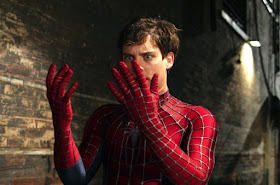 Jim Phelps (Jon Voight) and his Impossible Mission Force (IMF) are on a mission in Prague to retrieve a list of secret agents' real identities. The mission goes awry, with most of the team (which also consists of Emmanuelle Beart, Kristin Scott Thomas and Emilio Estevez) winding up dead, leaving only Ethan Hunt (Cruise) to figure out what the hell just happened. With Hunt the only survivor, IMF director Kittridge (Henry Czerny) suspects him to be the mole within the agency he has been trying to smoke out for years. Hunt flees to try and uncover the mole himself, finding a lead in the mysterious Max, a contact the mole had been communicating with using passages from the Bible. Finding himself disavowed by the government and without a team to help him, Hunt starts recruiting, finding a brand new team in fellow disavowed agents Luther Stickell (Ving Rhames) and Franz Krieger (Jean Reno). Their first mission is to break into the CIA headquarters in Langley and steal back the list, in the hope of finding the rat and proving Hunt's innocence.
Jim Phelps (Jon Voight) and his Impossible Mission Force (IMF) are on a mission in Prague to retrieve a list of secret agents' real identities. The mission goes awry, with most of the team (which also consists of Emmanuelle Beart, Kristin Scott Thomas and Emilio Estevez) winding up dead, leaving only Ethan Hunt (Cruise) to figure out what the hell just happened. With Hunt the only survivor, IMF director Kittridge (Henry Czerny) suspects him to be the mole within the agency he has been trying to smoke out for years. Hunt flees to try and uncover the mole himself, finding a lead in the mysterious Max, a contact the mole had been communicating with using passages from the Bible. Finding himself disavowed by the government and without a team to help him, Hunt starts recruiting, finding a brand new team in fellow disavowed agents Luther Stickell (Ving Rhames) and Franz Krieger (Jean Reno). Their first mission is to break into the CIA headquarters in Langley and steal back the list, in the hope of finding the rat and proving Hunt's innocence.There are three key set-pieces in Mission: Impossible that perhaps no other director is better suited for. De Palma is the master of long, tension-building moments of suspense, and Hunt's infiltration of the CIA is an iconic moment for good reason. He must enter into a room from above, copy a file while dangling from a wire, and exit within a set time. Any noise above a certain decibel level will trigger an alarm and cause a total lockdown, as will any additional weight on the floor. Filmed in complete silence, it's a masterfully choreographed sequence. As a trickle of sweat makes its way to the rim of Hunt's glasses, you won't exhale until it's all over. De Palma is better known for leaning of Hitchcockian influences, but his approach here is more Jules Dassin. There are other exciting moments too, and thank God, as the plot is about as baffling as its lead stars affiliation with Scientology. The thrills also distract from some pacing issues, which normally arise when Hunt is left to mope around in a hotel room, and some revelations you can see coming from a mile off (the shifty, knife-wielding Frenchman is a baddie, really?). Mission: Impossible really only has its momentum, so it's best just to strap in and go with it.
Directed by: Brian De Palma
Starring: Tom Cruise, Jon Voight, Emmanuelle Béart, Henry Czerny, Jean Reno, Ving Rhames, Kristin Scott Thomas, Vanessa Redgrave
Country: USA
Rating: ***
Tom Gillespie














